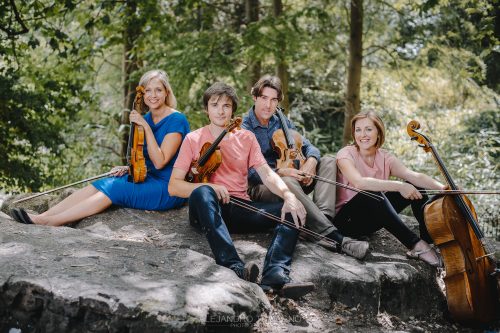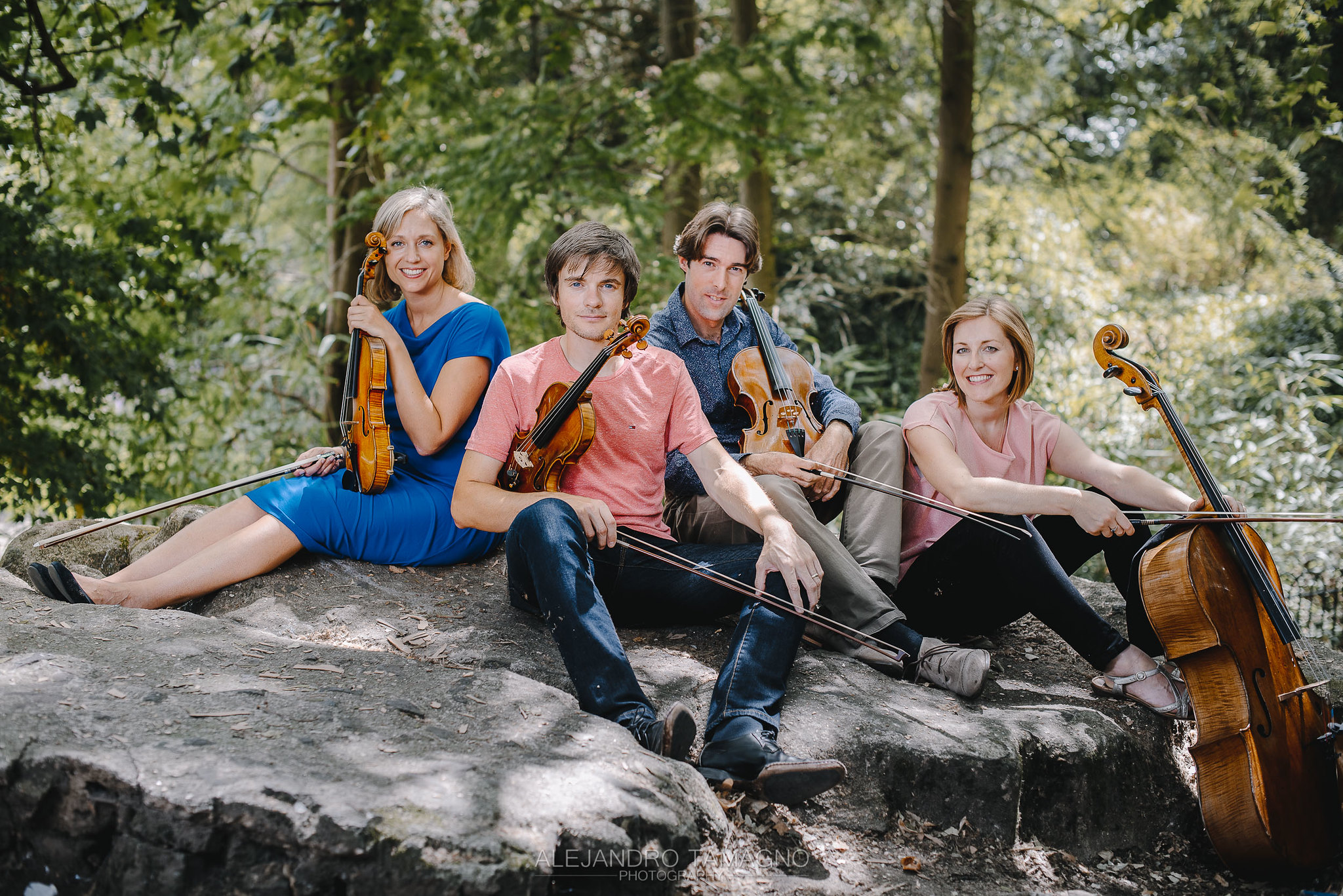 United Kingdom Roxanna Panufnik: Sacconi Quartet (Ben Hancox, Hannah Dawson [violins], Robin Ashwell [viola], Cara Berridge [cello]) with Andrew Marshall (double-bass) and Roderick Williams (baritone). Streamed live (Pete Fozard [vision and streaming] and Chris Kalcov [sound]) from Riverside, Twickenham, via YouTube (available click here), 21.7.2020. (CC)
United Kingdom Roxanna Panufnik: Sacconi Quartet (Ben Hancox, Hannah Dawson [violins], Robin Ashwell [viola], Cara Berridge [cello]) with Andrew Marshall (double-bass) and Roderick Williams (baritone). Streamed live (Pete Fozard [vision and streaming] and Chris Kalcov [sound]) from Riverside, Twickenham, via YouTube (available click here), 21.7.2020. (CC)

Panufnik – Canto for solo viola; Hora Bessarabia for violin and double bass; Heartfelt for string quartet (world premiere); Private Joe for baritone and string quartet
Powerful music in a gorgeous setting; what more could one ask for? This streamed concert offered just over an hour’s worth of music by Roxanna Panufnik, introduced by the composer. It was an eminently civilised experience. Audience levels, according to YouTube’s counter, sat nicely in the hundreds, so a nice equivalent perhaps to what would have been in the ‘old normal’.
The actual venue was the house of Lady Camilla Panufnik (Roxanna’s mother and wife to Andrzej) clearly a beautiful space. This was the Sacconi Quartet’s first concert together since lockdown began, and the sheer joy of the act of playing shone throughout. Even better news is that from Tuesday to Thursday next week (28-30 July), the repertoire will be recorded at Saffron Hall for release on Signum Records.
Roxanna Panufnik eloquently and charmingly introduced the first two pieces, both competition pieces. First, the Canto for solo viola written for the Lionel Tertis International Viola Competition – a technically demanding piece containing lyrical contrasts. Tertis was an Ashkenazi Jew (as is 50% of Panufnik, she explained). The work uses a chant that she then develops, hence calling it ‘Canto’; but it also turned out that Tertis’s father was actually a Cantor at a synagogue.
Robin Ashwell, the violist of the Sacconi Quartet, delivered the piece with perfect soulfulness; and perfect double-stopping to boot, but it was the melancholy, haunting, nature of the piece that resonated on.
The Hora Bessarabia was originally for violin, for another competition, the Menuhin. 2020 would have been Menuhin’s 100th birthday year – and Menuhin loved gypsy music. Panufnik’s piece invokes a Romanian and Hungarian doina (slow and lyrical) and hora (fast and virtuosic). Panufnik gave a lovely introduction including a story about a violin bought for a pound by her mother that Menuhin actually played. Played by violin and double-bass (Hannah Dawson and Andrew Marshall), the piece begins with soulful (again!) violin; the registral space of violin and double-bass is really well used by Panufnik to create a sense of longing while also taking the music into a more modern arena. All credit to Dawson’s impeccable tuning and Marshall’s evident virtuosity in the agile double bass part. The communication between the two instrumentalists was a joy, and as the music moved from reflective to extrovert (complete with foot slappings) so we heard the rawness of folk music translated into Panufnik’s idiom. The piece is a masterclass in honouring the original feel of the dances within a personal expression.
Heartfelt was receiving its world premiere and it is a whole piece about the heart: Dr Razir Saltanova, told the composer about seventeenth-century Uzbekistan musicians taking the tempo of the music they played from their pulse. Here Ben Hancox, the first violin, takes his pulse and sets the tempo for the piece, which goes on to imitate various Uzbek instruments (several musics are heard simultaneously towards the end) as well as describe in sound a processional with unruly camels (the first movement is entitled ‘Uzbek Processional’). Dance rhythms and shards of traditional melody meet pizzicato tremolandi as an Uzbek lute is imitated. The second movement, ‘Lament for a Bulgarian Dancing Bear’ concerns the plight of Romanian bears, and a defining question in its genesis was ‘What would a bear’s heartbeat sound like?’. Through Bristol Zoological Society the composer found a recording of Albie the bear’s heartbeat (the bear was under anaesthetic at the time). We hear Bulgarian melodies and ornamentation, and an imitation of a kadulka, a Bulgarian traditional violin that accompanied dancing bears. Repeated notes depict the bear’s heartbeat (an effect that recalls the heartbeat in Berlioz’s La mort de Cléopâtre, perhaps). The whole is shot through with a poignancy that is infinitely touching. All credit to the Sacconi Quartet for a performance that felt faultless; the piece was given with huge confidence, rock-solid rhythm (which it needs because of the heartbeat element) and a sure sense of direction. Perhaps a special mention for the long viola solo in the second movement, which passes to the cello, both wonderfully rendered. Panufnik judges atmospherics such as asynchronicity perfectly, just as she does the music blossoming out into consonances. A wonderful work: the recording is keenly anticipated.
The final piece was Private Joe, for baritone and string quartet (or string orchestra). Originally for baritone Nigel Cliffe, the piece was occasioned by Cliffe’s finding two letters from his great uncle, Private Joe Wood, who was fighting in the First World War. Joe was sadly killed in action on 26 September 1917 at the Battle of Polygon Wood, Ypres. The two letters, written less than a week apart, differ substantially in mood, and Panufnik fills the days in between the letters with three ‘Chapters’; the traditional ‘And when I die’, Wilfred Owen’s ‘The Letter’, and Alec Waugh’s ‘From Albert to Bapaume’. The frame of emotion of the piece is huge, from popular song (with a call and response between Williams and the singing players of the Sacconi Quartet) to utter desolation. Williams’s voice is perfect for the plangent expressivity of Panufnik’s lines, while the string quartet sometimes carries the weight of the world. Further, Williams delivered the songs in a variety of flawless regional accents.
A terrific hour and a bit’s music, now enshrined on YouTube (link above) while we await the Signum disc. Fabulous music, brilliantly performed with real devotion and understanding.
Colin Clarke
